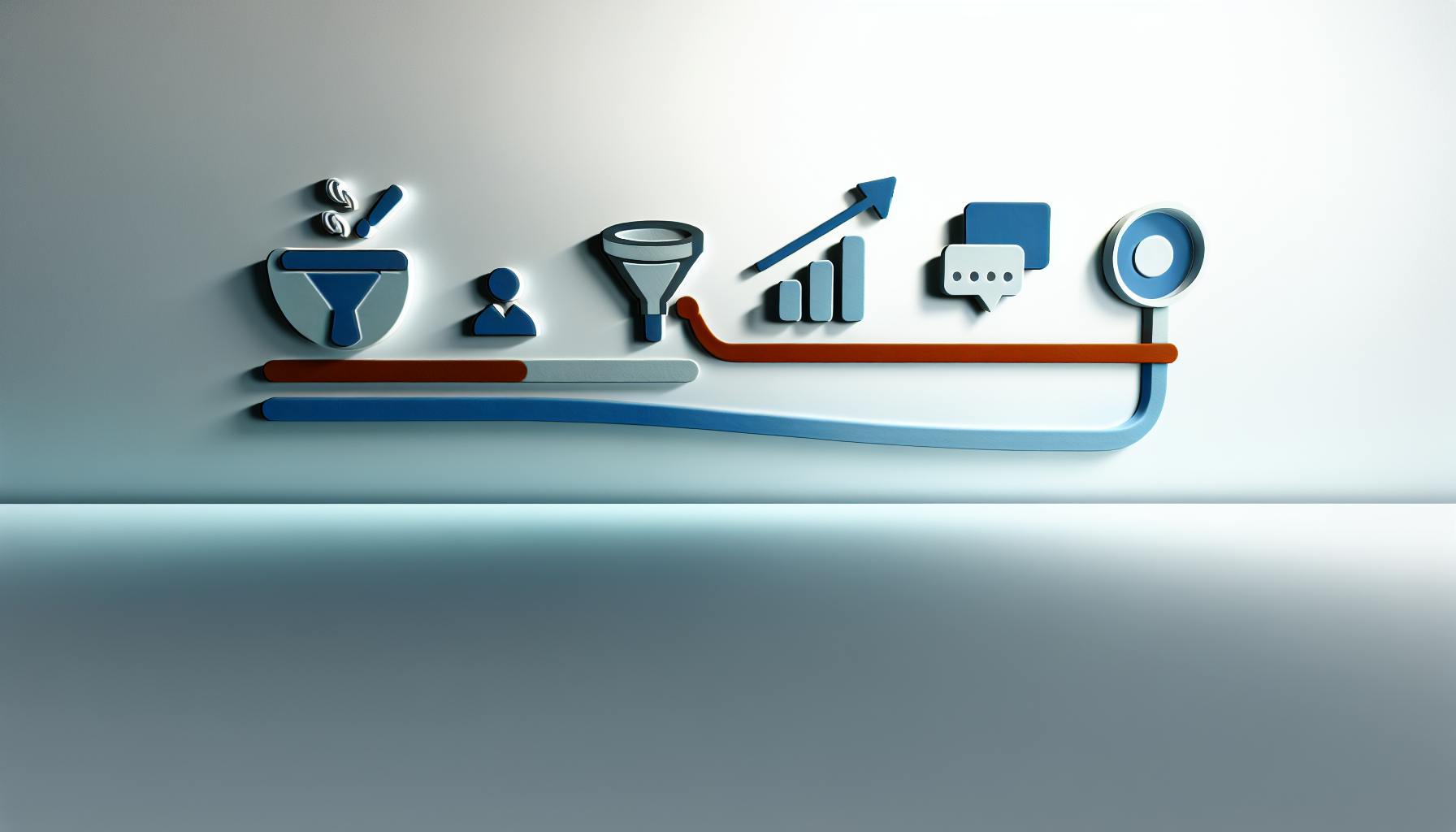Want better sales leads in 2025? Start with your CRM.
CRM systems are transforming how businesses find and convert leads. With AI, automation, and data-driven tools, they help sales teams focus on quality over quantity, boost efficiency, and drive results. Here's what you need to know:
- Lead Scoring with AI: CRMs like HubSpot predict which leads will convert using machine learning.
- Automation: Tools like Salesforce automate follow-ups, lifecycle updates, and lead qualification.
- Data-Driven Outreach: CRMs use predictive analytics to personalize emails and target the right audience.
- Multi-Channel Integration: Collect leads from LinkedIn, Instagram, and more, directly into your CRM.
- Mobile CRM: Update leads and access data instantly from any device.
In 2025, businesses using AI-driven CRMs report up to 51% higher lead-to-deal conversion rates. To stay ahead, focus on automation, clean data, and personalized engagement.
Want details? Keep reading for actionable insights and examples from companies like Spotify, Grammarly, and more.
How To Generate Leads: 4 Best AI Tools (And ChatGPT Prompts) For 2025
Lead Scoring and Qualification with CRM Tools
Modern CRM tools are taking lead evaluation to the next level, thanks to advancements in AI and machine learning. By digging into massive datasets - like website activity, email interactions, and social media engagement - these systems can now predict which leads are most likely to turn into paying customers.
Machine Learning for Lead Scoring
AI-driven CRMs make lead scoring more precise by using data insights instead of guesswork. For example, HubSpot's AI-powered engagement scoring evaluates lead behavior to estimate conversion potential. It pulls together data from multiple sources into one streamlined scoring system.
Setting Lead Qualification Standards
To qualify leads effectively, you need clear, business-specific criteria. Salesforce explains it well: "Lead qualification helps you determine whether a prospective customer is a good fit for your product(s). Two main factors determine whether a lead is qualified: 1) Your product will fulfill their needs, and 2) they can afford it".
Take Spotify as an example. In March 2023, Spotify partnered with Mailchimp to clean up its massive 45-million subscriber database using Mailchimp's Email Verification API. This reduced bounce rates from 12.3% to 2.1% in just 60 days, improved email deliverability by 34%, and generated an extra $2.3 million in revenue (Mailchimp Case Studies, 2023).
Once your standards are set, automation can make the qualification process even more efficient.
Lead Qualification Automation
CRMs are now automating much of the lead qualification process. HubSpot, for instance, uses workflows to automatically update lifecycle stages or alert sales teams when a lead hits a specific score threshold.
"AI can significantly enhance lead scoring within marketing automation platforms (MAPs) by analyzing vast amounts of data, identifying patterns, and predicting which leads are most likely to convert".
Top automation tools in today’s CRMs include:
- Smart Forms that adjust based on lead data
- Real-time Alerts to keep teams informed about key lead actions
- Chatbot Integration for 24/7 lead qualification
- Automated Follow-ups for personalized outreach
One B2B company recently showed how effective AI-assisted scoring can be. By focusing on enterprise clients, they used AI to evaluate leads based on company size and industry fit. This approach helped their sales team zero in on high-value opportunities and cut down the sales cycle significantly.
Using CRM Data for Targeted Outreach
Modern CRM systems have reshaped how businesses approach outreach, relying heavily on data-driven strategies. Companies that use predictive analytics through their CRM often see better results compared to their competitors. For example, they report an 81% improvement in operational efficiency versus 58% for non-users, and a 77% boost in revenue generation compared to 61%. This approach enables more precise and effective outreach methods.
Predictive Analysis for Customer Outreach
CRM tools now go beyond basic lead qualification by offering insights that support personalized outreach. Using AI, these platforms analyze customer data to forecast behaviors, helping sales teams determine the best timing and strategies for engagement. For instance, Microsoft applies predictive analytics in its CRM to identify high-value prospects, leading to noticeable improvements in sales productivity. Similarly, First Round Capital revamped their outreach by enriching and automatically updating over 220,000 CRM contacts, making their targeting faster and more cost-effective.
Data-Driven Email Personalization
Email personalization has evolved far beyond simply addressing a prospect by name. Modern CRM systems allow for advanced segmentation based on various criteria, such as:
| Segmentation Criteria | Data Points Tracked |
|---|---|
| Behavioral Patterns | Website visits, content downloads, email engagement |
| Purchase History | Previous orders, average order value, product preferences |
| Engagement Level | Email open rates, click-through rates, response timing |
| Company Demographics | Industry, size, revenue, technology stack |
For example, ServiceBell used enriched CRM data to target qualified leads, successfully booking 30 meetings with just an hour of work.
"Huge time saver - it saves us between 5 and 8 minutes to create personalization per each lead." - Ali Rahmani, Co-Founder @Tango Prospection
Customer Behavior Tracking
CRM systems now include behavior tracking features that help businesses better understand their prospects' intentions. Coverflex, for instance, uses automated signal-based outreach to engage with over 3 million companies, generating more than 200 monthly demos. Key metrics tracked include:
- Website Interaction: Pages visited, time spent, and content downloaded.
- Email Engagement: Open rates (15–25% is strong) and click-through rates (2.5–3% is ideal).
- Purchase Patterns: Buying frequency, preferred products, and average order value.
"A CRM system will allow you to centralize the data you're collecting and create a single source of truth that will enable you to have a 360-degree view of your customer. It will also allow your entire company to access the data necessary to help address customer pain points, build customer loyalty and create full-funnel reports and dashboards for the company leadership to make data-driven decisions." - Heather Davis Lam, founder and CEO of Revenue Ops LLC
Companies like Qrew have seen impressive results by leveraging these tracking tools, cutting manual hours by 50% and doubling the number of meetings booked. These capabilities enhance earlier CRM functionalities, streamlining the entire sales process.
sbb-itb-8aac02d
Multi-Channel Lead Collection
Modern CRM systems now gather leads from various platforms, combining customer data to improve both the quality and quantity of leads as we move into 2025.
Social Media Platform Integration
CRM platforms integrate directly with major social media networks, automating lead collection and providing detailed insights into how prospects behave.
| Platform Integration | Key Benefits | Lead Generation Features |
|---|---|---|
| B2B targeting, professional connections | Profile enrichment, connection tracking | |
| Engaging consumers, audience targeting | Lead form integration, engagement metrics | |
| Boosting brand awareness, visual engagement | Story interactions, direct message leads |
These integrations allow sales teams to monitor engagement metrics and overall sales performance directly within their CRM dashboards. For example, HubSpot and Salesforce excel in social media integration, while Zoho offers strong marketing automation tools at a lower price point. This integration ensures continuous lead collection across multiple channels.
24/7 Lead Collection with AI Tools
Zipteams shared that its AI-powered lead management system increased sales-qualified leads by 40% by analyzing over 800,000 sales calls monthly, leading to a 5% boost in conversion rates.
Key AI features include:
- Automated Data Entry: AI captures and organizes lead information without manual effort.
- Real-time Lead Scoring: Automatically ranks leads based on their likelihood to convert.
- Sentiment Analysis: Analyzes customer interactions to measure interest levels.
- Predictive Analytics: Forecasts lead conversion rates and potential revenue.
Mobile Lead Collection Methods
Mobile CRM tools are now a must-have for sales teams. They let professionals update lead statuses, schedule follow-ups, and access critical information instantly from any mobile device.
The success of mobile lead collection depends on the CRM's mobile design and usability. Top platforms have optimized their mobile interfaces to ensure productivity, whether users work remotely or in the field. Businesses should prioritize CRM systems that offer strong mobile capabilities and ensure data stays synced across all devices. This keeps lead information accurate and accessible, no matter where it's collected.
Lead Nurturing Automation
Today's CRMs take the hassle out of lead nurturing by automating much of the process. This helps prospects move smoothly through the sales pipeline while reducing the need for manual effort.
Automated Email Campaigns
Platforms like HubSpot and Pipedrive simplify email campaigns with advanced automation tools. These tools help ensure emails are delivered effectively and on time by using clear triggers and scheduled communications. Beyond basic automation, these systems can react to real-time lead behaviors, tailoring messages to keep prospects engaged and interested.
Action-Based Response Systems
Modern CRMs now include tools that respond automatically to specific actions taken by leads. For example, HubSpot’s site chat on its pricing page uses automated questions to share pricing details while collecting valuable lead information for the sales team. These systems make sure prospects get timely responses based on their actions, improving the overall engagement process.
Smart Content Selection
AI-driven tools are changing the game for content strategies in CRMs. HubSpot’s Content Remix Tool, launched in 2024, helps businesses transform a single piece of content into multiple formats, making it easier to stay active across different platforms. Using behavioral insights, predictive analytics, and dynamic personalization, these tools ensure the right content reaches the right audience at the perfect time.
"Our AI-powered content creation suite helps you build effective omnichannel marketing campaigns faster than ever before".
With this technology, sales teams can create highly targeted content that connects with specific audience groups while saving time and effort.
2025 CRM Tools and Updates
The latest CRM updates are making waves by enhancing automated lead nurturing and delivering sharper, data-driven outreach. These tools are giving sales teams real-time insights and AI-powered precision, improving lead scoring, outreach efforts, and overall performance tracking.
AI Updates in CRM Systems
AI is transforming CRM platforms, especially in lead generation. Businesses using AI-driven lead scoring have reported a 51% boost in lead-to-deal conversion rates. For instance, Microsoft's AI-powered system "BEAM" significantly increased their conversion rate from 4% to 18% for sales-qualified opportunities.
Generative AI is also playing a key role in automating prospect research and tailoring email outreach. Apollo's AI "Power-Ups" have scaled personalized outreach by a factor of ten.
"Personalisation and privacy are often seen as opposing forces, but they don't have to be. The key lies in transparent communication and the ethical use of AI. Brands must show consumers the value they receive in exchange for their data" - Mary Chen, Chief Data Officer at DataFlow Inc
Advanced Sales Data Tools
The sales intelligence market is projected to hit $8.25 billion by 2033, driving advancements in data tools. Here's how some leading platforms compare:
| Platform | Key Features | G2 Rating |
|---|---|---|
| Apollo.io | AI-powered prospecting, data enrichment | 4.8/5 (7,541 reviews) |
| ZoomInfo | Intent data, company insights | 4.4/5 (8,654 reviews) |
| Cognism | Phone-verified contacts, GDPR compliance | 4.6/5 (751 reviews) |
Built In highlights how Apollo's automated data enrichment keeps their database of over 100,000 accounts current, resulting in a 10% increase in both win rates and average deal size.
Live Performance Tracking
Real-time performance tracking is now essential for sales teams. Wrike's AI-driven chatbots have delivered impressive results, increasing pipeline generation by 496% and bookings by 454%. Advanced analytics tools enable teams to monitor lead quality and engagement metrics instantly, allowing them to act quickly on high-potential opportunities.
"Keeping up with demand in this increasingly competitive landscape wouldn't be possible without technology. We want to give our loan officers the tools and the data that they need to advise customers and to execute, especially on lead conversion." - Gemma Currier, Senior Vice President of Retail Sales Operations at Guild Mortgage
Companies leveraging these tools are twice as likely to rank among the top performers in their industries. These advancements continue to cement CRM systems as a cornerstone of modern sales strategies.
Conclusion: Effective CRM Use for Sales Leads
CRM systems play a crucial role in generating high-quality sales leads in 2025. Research shows that B2B companies see 24% faster revenue growth when they align their sales and marketing efforts effectively. Using CRM tools strategically can deliver measurable results.
AI-powered features in platforms like HubSpot, Pipedrive, and Apollo have revolutionized lead generation. For example, HubSpot's dual scoring system helps teams assess leads based on both engagement and demographic fit. Meanwhile, Pipedrive's Smart Contact Data feature enriches lead profiles automatically with relevant web data. These advancements enhance lead evaluation and contribute to revenue growth.
"Lead scoring is an effective way to allocate time and money in such a way that it generates maximum ROI for the business as it grows."
Looking ahead, the future of CRM-driven lead generation lies in automation and personalization. By 2025, 70% of organizations are expected to adopt automation to boost efficiency. Additionally, 71% of consumers now anticipate personalized interactions.
To stay competitive, sales teams should focus on maintaining clean databases, implementing strong lead scoring systems, and leveraging predictive analytics. As Suds Singh, Founder and MD of Interesting Content, points out:
"Pipedrive has enabled us to have instant access to that data, so it's not just quadrupling revenue while ensuring predictability."
Franziska Palumbo-Seidel, CEO of Key Search, echoes this sentiment:
"Pipedrive adapts well to what we need, and I like that. Unlike other CRM solutions, it fits our needs and doesn't force us to simply conform to what it can provide."


